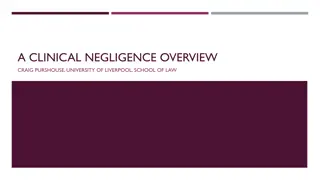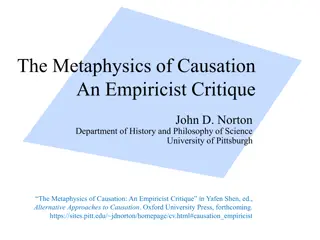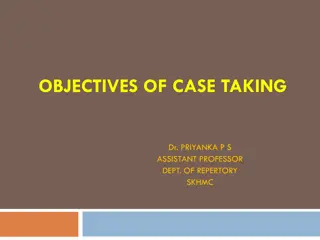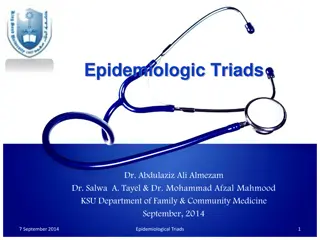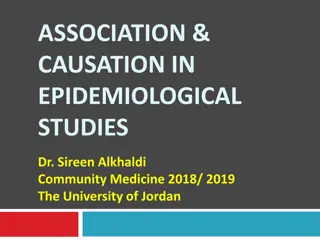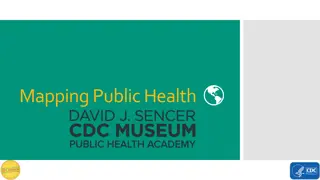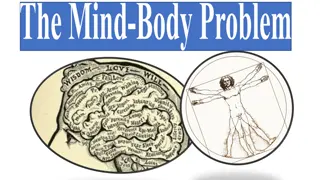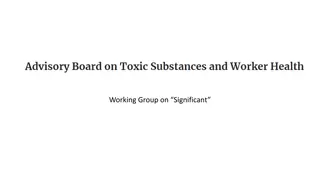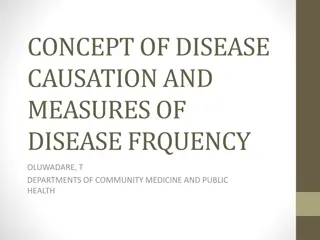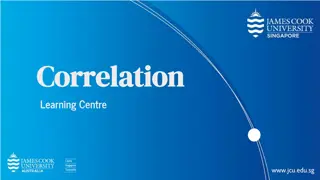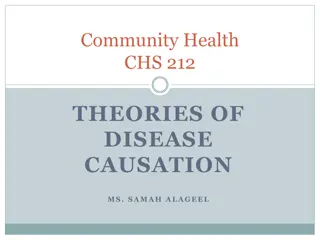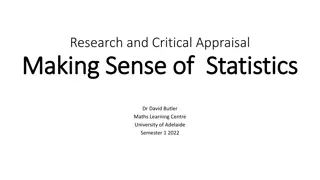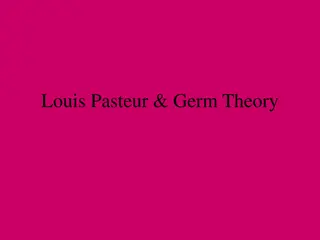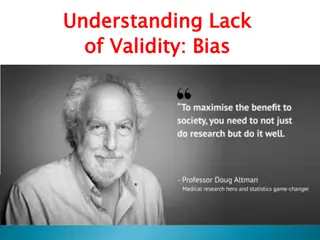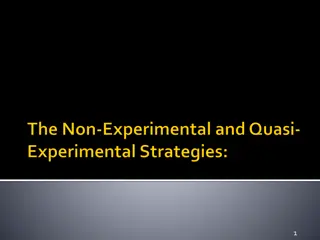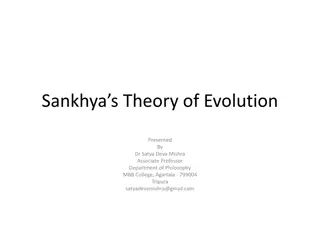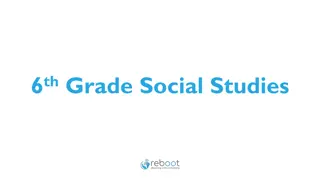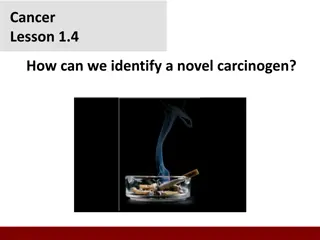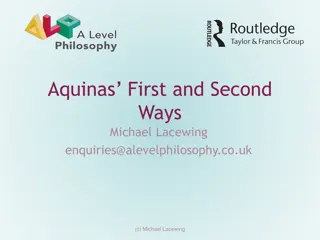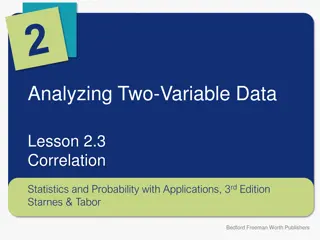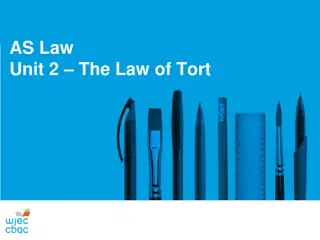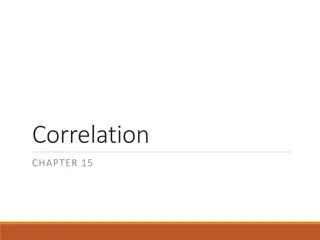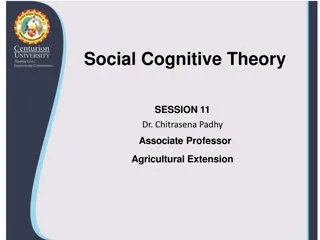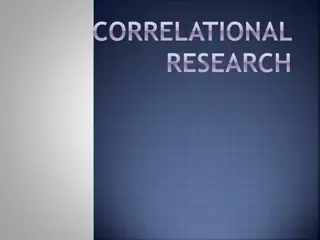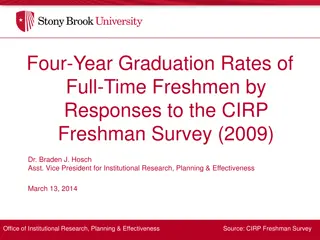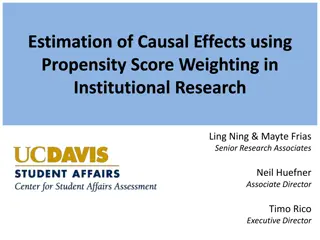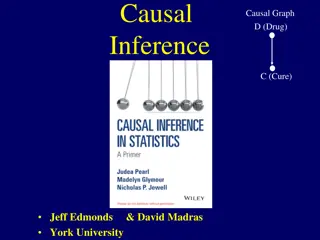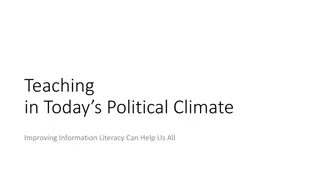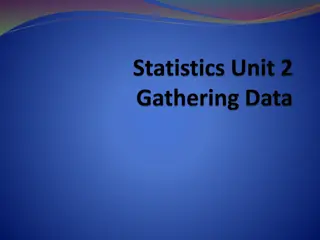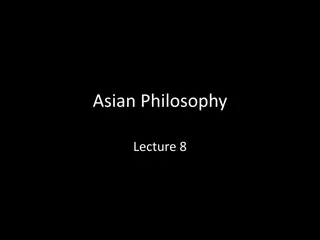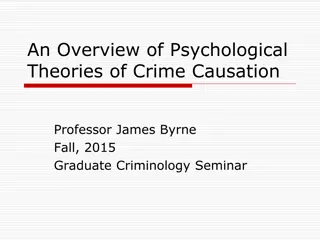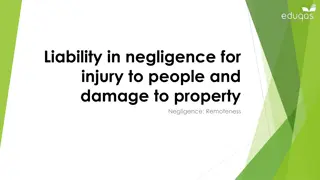Understanding Psychological Claims in the Workplace
Exploring the rise of psychological claims in work comp, this information covers types of mental stress claims, psychological claim regulations by state, standards of causation for physical injury-mental stress and mental stress-mental stress, as well as examples of how work-related stress can impac
1 views • 22 slides
A CLINICAL NEGLIGENCE OVERVIEW
Clinical negligence claims require claimants to establish duty of care, breach of duty, causation, and more. Healthcare workers owe patients a duty of care to avoid physical injuries. The law on advice has evolved with cases like Montgomery, emphasizing the importance of informed consent. Recent leg
1 views • 19 slides
Critique of Causal Metaphysics and Empiricism
In this content, the author critiques the metaphysics of causation from an empiricist perspective, exploring the limitations of empiricism in understanding the contingent truths of the world. It discusses causal antifundamentalism, various forms of skepticism, including Humean skepticism, and challe
4 views • 55 slides
Objectives of Case Taking in Homeopathy
Case taking in homeopathy serves various objectives, including understanding the patient in their environment, defining the person's problem, managing the case effectively, helping the patient cooperate in treatment, selecting remedies, perceiving the patient's true state, and analyzing symptoms for
0 views • 9 slides
Understanding Epidemiologic Triads in Disease Causation
Epidemiologic triads are essential models for studying disease causation, with a focus on descriptive and analytical epidemiology. By exploring factors such as person, place, time, agent, host, and environment, researchers can identify key relationships in the spread and prevention of diseases. The
2 views • 24 slides
Understanding Association and Causation in Epidemiological Studies
Exploring the concepts of association and causation in epidemiological studies, this content delves into the complexities of determining if exposure leads to disease risk. It discusses different types of associations, such as spurious, indirect, and direct causal associations, illustrating the chall
5 views • 43 slides
Understanding the Use of Maps in Public Health
Maps play a crucial role in public health by visualizing health data, trends, and locations of health events. They are used to communicate information such as disease rates, outbreaks, and causal factors. Spot maps show individual case locations, while area maps use colors or shades to communicate t
0 views • 15 slides
The Mind-Body Problem: Exploring Consciousness and Intentionality
Delve into the intriguing questions surrounding the mind-body problem, such as the nature of consciousness, intentionality, subjectivity, and causation. Explore the mysteries of how thoughts, beliefs, and sensory experiences interact with the physical body and the external world. Contemplate the eni
0 views • 33 slides
Understanding the Significance of Exposure in EEOICPA Procedures
Delve into the complexities of exposure assessment in the context of EEOICPA procedures, examining the nuances of significant exposure levels and their impact on causation determination. Explore proposed recommendations for refining exposure assessment metrics to enhance causation evaluation.
0 views • 9 slides
Understanding Disease Causation and Frequency Measures
The concept of disease causation delves into the factors that play a role in the development of diseases, emphasizing the importance of studying causation for prevention, control, and treatment. To infer causation, certain conditions must be met, and a causal relationship is characterized by associa
0 views • 47 slides
Understanding Correlation and Causation in Data Analysis
A correlation analysis assesses the relationship strength and direction between two variables using the Pearson correlation coefficient. It's crucial to differentiate between correlation and causation, where correlation indicates a relationship but not causation. Exploring examples like ice cream sa
0 views • 13 slides
Theories of Disease Causation and Historical Perspectives
Explore the evolution of disease causation theories from miasma theory to germ theory, epidemiological models, and the socio-environmental approach. Understand the definition of disease, its causes, and how ancient beliefs in spiritual or mechanical forces led to new scientific interpretations.
0 views • 30 slides
Deciphering the Role of Statistics in Research and Critical Appraisal
Understanding the essence of statistics in research, this content explores the significance of statistics in describing variations, predicting outcomes, and controlling variables. It emphasizes the distinction between single-concept and relationship-based research questions, and warns against misint
0 views • 34 slides
Journey to Understanding Disease Causes
Louis Pasteur's advancements in microbiology, from the discovery of microorganisms by Leeuwenhoek to the establishment of germ theory, revolutionized our understanding of disease causation. Through improved microscopes and experiments, Pasteur's work linked microorganisms to disease, setting the sta
0 views • 10 slides
Understanding Bias and Validity in Statistical Analysis
Statistical analysis involves considerations of chance, bias, confounding, causation, sample size, and power to ensure valid results. Understanding the impact of these factors is crucial for accurate interpretation of study outcomes and decision-making processes.
0 views • 45 slides
Understanding Nonexperimental and Quasi-experimental Studies
Nonexperimental and quasi-experimental studies resemble experiments but lack random assignment, making them valuable for group comparisons without establishing causation. This type of research design looks at differences between groups that already exist, focusing on group differences rather than ca
1 views • 35 slides
Sankhya's Theory of Evolution Explained by Dr. Satya Deva Mishra
Explore the Sankhya philosophy's theory of evolution as presented by Dr. Satya Deva Mishra, covering concepts such as Prakrti, Purusa, theory of causation, evolutes of Prakrti, and the purpose of evolution towards liberation and self-realization.
2 views • 8 slides
Understanding Fallacies in 6th Grade Social Studies
Explore the world of fallacies in 6th Grade Social Studies through examples and activities. Learn about biases, experimenter bias, confirmation bias, correlation vs. causation, random chance, lack of control group, and overgeneralization. Engage in group activities to identify and discuss different
3 views • 8 slides
Understanding Carcinogens and Causation in Cancer Research
Exploring the identification of novel carcinogens and proving causation in cancer research through examples like the Ames test, Koch's postulates, and distinguishing between causation and correlation. The challenges in attributing cancer causation and the importance of conclusive evidence for behavi
1 views • 16 slides
Astrological Factors in Mass Shootings: Exploring Statistical Significance
Mass Shooting Events (MSEs) are a growing concern, with this research focusing on determining astrological factors associated with such events. The study urges caution against atheoretical research approaches and emphasizes the need for a theoretical relationship between astrological factors and MSE
0 views • 47 slides
Theories of Causation in Psychological and Social Sciences
Overview of theories of causation categorized into psychological, social psychological, and sociological perspectives. Psychological theories focus on instinctive, biological, and psychological qualities of abusers, including Attachment Theory, Psychodynamic Theory, Social Learning Theory, and Situa
0 views • 15 slides
Exploring Aquinas' Arguments for the Existence of God
Aquinas presents compelling arguments for the existence of God through the First and Second Ways, highlighting the necessity of a first cause and sustaining causes in the world. By delving into concepts of temporal and sustaining causes, Aquinas builds a philosophical framework that leads to the con
6 views • 16 slides
Understanding Correlation in Two-Variable Data Analysis
Exploring the concept of correlation in analyzing two-variable data, this lesson delves into estimating the correlation between quantitative variables, interpreting the correlation, and distinguishing between correlation and causation. Through scatterplots and examples, the strength and direction of
0 views • 13 slides
Insights on AS Law Unit 2: The Law of Tort Exam
Detailed feedback on the May 2019 AS Law Unit 2 exam focusing on topics like the Caparo three-part test for duty of care, causation in tort law, and breach of duty of care. The assessment highlights candidate performance, common mistakes, need for relevant case law, and key elements required for a c
0 views • 9 slides
Understanding Correlation in Research Designs
Research designs like experimental, quasi-experimental, and correlational serve different purposes in studying variable relationships. Correlation does not imply causation and can be positive or negative, indicating how two variables change together. The correlation coefficient quantifies this relat
5 views • 43 slides
Understanding Social Cognitive Theory: Insights from Albert Bandura
Social Cognitive Theory, developed by Albert Bandura, emphasizes learning through observation and modeling behaviors. The theory explores how individuals acquire new behaviors, thoughts, and attitudes by observing others. Bandura's famous Bobo doll experiment showcased how children imitated aggressi
6 views • 17 slides
Understanding Correlational Research in Psychology
Correlational research in psychology focuses on determining the degree of relationship between variables without manipulation. It helps show the magnitude of association but not causation. Correlation coefficient indicates the existence, degree, and direction of the relationship between variables. P
0 views • 38 slides
Understanding Professional Duties in Accountancy
This informative content discusses various aspects of professional duties in accountancy, such as negligence, breach of duty of care, causation, asset valuation, and ethics. It covers topics like duty of care, foreseeability test, breach of duty standards, causation principles, and the accountants'
1 views • 10 slides
Factors Influencing Four-Year Graduation Rates of Full-Time Freshmen
Inputs from the 2009 CIRP Freshman Survey play a significant role in influencing graduation rates. Factors impacting these rates fall into categories such as High School Academics, Social Experience in High School, Admissions & Financial Aid, and Plans for Campus Engagement. The methodology involved
1 views • 36 slides
The Grim Reaper Paradox: A Metaphysical Inquiry into Time and Causation
Exploring the intriguing Grim Reaper paradox and its implications on the necessity of finitude in time and causation, this content delves into various philosophical arguments surrounding the concept of infinity and the nature of existence. Through detailed analyses of different paradoxes and argumen
0 views • 33 slides
Understanding Murder in Common Law
Murder, as defined in common law, is the unlawful killing of a human being with malice aforethought. This act involves both actus reus (unlawful killing caused by the defendant) and mens rea (intention to kill or cause grievous bodily harm). Legal causation, including thin skull test, chain of causa
0 views • 18 slides
Estimation of Causal Effects using Propensity Score Weighting
Understanding causal effects through methods like propensity score weighting is crucial in institutional research. This approach helps in estimating the impact of various interventions, such as a writing program, by distinguishing causation from correlation. The use of propensity score matching aids
0 views • 22 slides
Understanding Causal Inference and Causal Graphs in Drug Efficacy Studies
This content delves into the concept of causal inference using causal graphs, specifically focusing on the relationship between a drug (D) and its effectiveness in curing a condition (C). It discusses the importance of distinguishing correlation from causation and explores scenarios where confoundin
0 views • 66 slides
Navigating Today's Political Climate: Enhancing Information Literacy
Explore the importance of improving information literacy in the current political landscape to encourage critical thinking, combat cognitive biases, and become informed consumers of statistics. Dive into the evaluation process, skepticism, and the recognition that correlation does not imply causatio
0 views • 13 slides
Choosing Between Observational Study and Experiment in Research
Observational studies involve recording data without interfering with subjects, while experiments impose treatments on subjects to establish cause and effect. A well-controlled experiment is crucial for determining causation, while observational studies can provide quick results at lower costs. Each
0 views • 24 slides
Exploring Sankhya Philosophy: Metaphysical Dualism and Causation
Delve into the ancient Sankhya philosophy, the oldest school of Indian philosophy founded by Kapila. Discover its metaphysical goal of avoiding monistic materialism and idealism, leading to a dualism between nature and spirit. Explore the concepts of Prakriti (Nature) and Purusha (Self), along with
0 views • 38 slides
Exploring Time and Change in Philosophy: Possible Worlds and Causation
Dive into the intriguing concept of time without change in the philosophical discourse presented by Cathy Legg from the University of Waikato. Delve into the Regularity Theory of Causation, examining the close relationship between time and change, challenges to traditional views, and the possibility
0 views • 27 slides
Understanding Correlation and Causation
Explore the concepts of correlation and causation through various scenarios such as handwashing and sickness, wearing a favorite football jersey and winning games, or memorizing study guides for tests. Distinguish between correlation and causation with thought-provoking examples like ice cream sales
0 views • 14 slides
Psychological Theories of Crime Causation: An Overview
Psychological theories of crime causation explore factors such as psychological development, childhood experiences, socialization, and individual characteristics that contribute to criminal behavior. These theories delve into the influence of mental disorders, personality traits, and psychoanalytic
0 views • 16 slides
Understanding Liability in Negligence: Remoteness and Causation
Explore the concept of legal causation in negligence cases by delving into the tests for establishing remoteness. Dive into landmark cases like Re Polemis & Furness, Withy & Co Ltd. [1921] and Overseas Tankship (UK) Ltd v. Morts Dock and Engineering Co Ltd or (Wagon Mound) (No. 1) [1961] to understa
0 views • 12 slides

